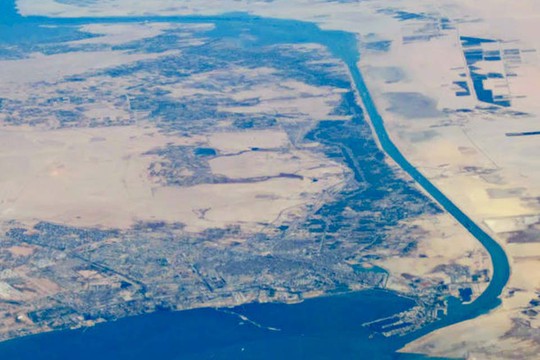Suez Canal. Between 12 and 15 percent of total world trade goes through this maritime shortcut bottleneck — making it a prime target.
When I left as an envoy from the European Parliament to Cairo in 2011, a Barcelona MEP told me that if I succeeded in holding up the Suez Canal, my mission would be successful. That was meant as a joke, of course, but it did draw my attention to the global importance of the Suez Canal and the Red Sea, writes Koert Debeuf, a distinguished adjunct professor of the Middle East at Vrije Universiteit Brussels and chair of the board of EUobserver.
But it was only when I was literally standing at the edge of the canal, watching huge container ships sailing uninterrupted to and from the Red Sea, that it dawned on me how important this strait is to our global economy. Between 12 and 15 per cent of total world trade takes this route.
A year later, I visited Djibouti, a small country with a very strategic location, on Bab Al Mandeb, a strait barely 27km wide between the Red Sea and the Gulf of Aden.
There, the latest frigates of the US, French and British military were stationed to chase away Somali pirates. Since 2010, those pirates have been trying to hijack container ships, taking the crew hostage and demanding ransoms. It was an impressive operation in which the West, especially the United States, took on the post-war role of protecting economic sea routes.
However, the Houthi rebels' attacks from Yemen in the same Bab Al Mandeb strait are of a very different order. They are not pirates seeking extra revenue. The Houthi rebels are an ideologically and politically motivated population group that deliberately wants to crush world trade. With the financial, political and military support of Iran, they are trying to increase pressure on the West to increase pressure on Israel to stop the war in Gaza.
The consequence of the Houthi attacks and thus the disruption to world trade is so great that we can hardly estimate the impact. The additional cost of rerouting through the Cape of Good Hope in South Africa has doubled and in some cases tripled the cost per ship.
According to the UN Conference on Trade and Development, better known as UNCTAD, world trade will shrink by five percent by 2024 and food and energy prices will skyrocket. It is unclear how big this effect will be, but the predictions do not look good.
The Chinese military could help the US and the UK stop the attacks. Indeed, it has a military base in Djibouti and operates part of the small country's seaport. It is China's only foreign military base. Estimates of the number of soldiers in that base range from a thousand to ten thousand. According to China, it is not a military but a logistics base, set up to coordinate evacuations of compatriots in Africa.
As if the military presence of Iran and China in the Red Sea was not enough to be worried, everything seems to indicate that Russia too will soon have a military base there, and in Sudan.
But Russia also has other plans. It wants to build a military base on the Sudanese coast on the Red Sea.
In other words, we are moving towards a scenario where Russia, Iran and China (not exactly the West's best friends) could cut one of the coronary arteries of the global economy, or at least severely disrupt it, with all the economic and political consequences that would entail. That is not a pleasant prospect, to say the least.
What can Europe, and the West as a whole, do to stop this scenario?
It is clear that every conflict carries with it a new conflict. Stopping wars is therefore the only way out. The war in Gaza must urgently stop. The war in Sudan must urgently stop. If Europe and the United States want to, they can put enough pressure on all the warring camps to at least declare a ceasefire and sit at the table.
Actually, it is no longer a matter of wanting, it is a matter of having to, Koert Debeuf, stresses.
read more in our Telegram-channel https://t.me/The_International_Affairs

 12:02 15.02.2024 •
12:02 15.02.2024 •























